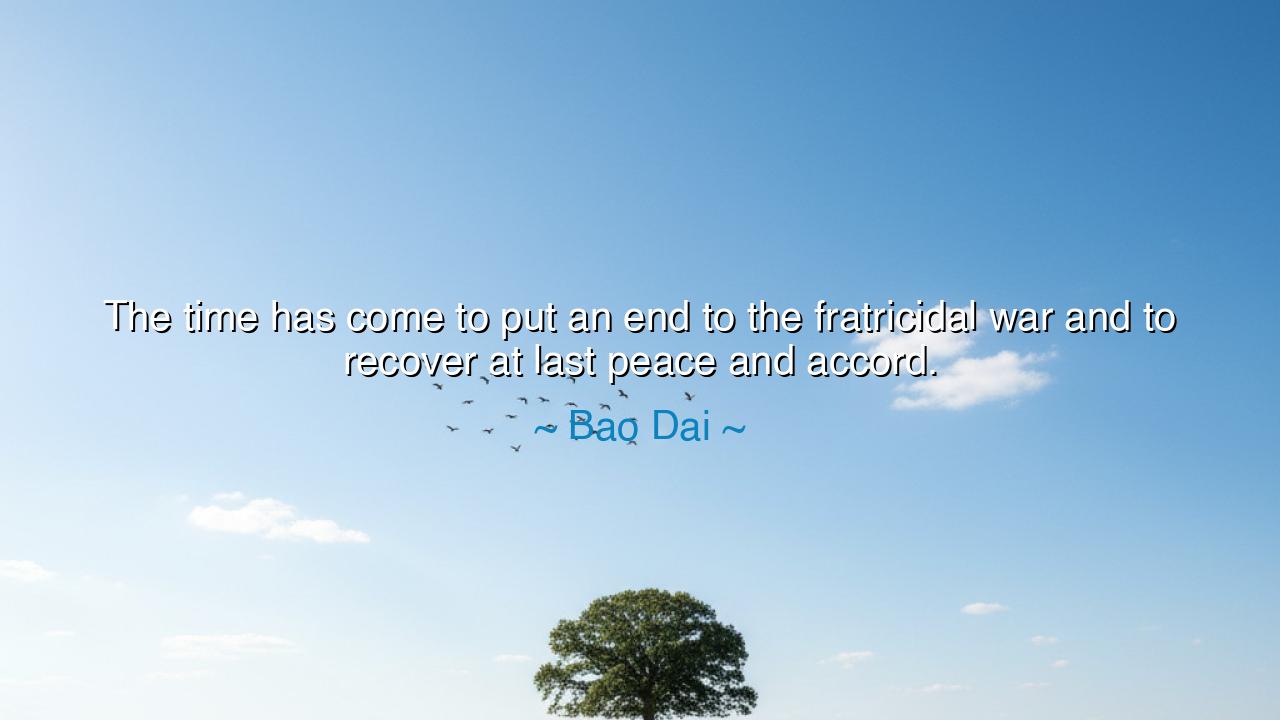
The time has come to put an end to the fratricidal war and to
The time has come to put an end to the fratricidal war and to recover at last peace and accord.






“The time has come to put an end to the fratricidal war and to recover at last peace and accord.” Thus spoke Bao Dai, the last emperor of Vietnam, whose words echoed not merely as a plea for politics but as a lament for the soul of his nation. His voice rose in a time when brother fought against brother, when blood tied by heritage was spilled in the dust of division. To name such conflict a fratricidal war was to reveal its deepest wound: that the enemy was not a stranger, but one’s own kin.
The ancients knew well the horror of civil strife. Thucydides, in his history of the Peloponnesian War, described how cities consumed themselves from within—neighbors turning upon neighbors, families split by allegiance, and trust devoured by suspicion. Such wars, he said, were more terrible than any fought against a foreign foe, for they shattered the bonds of brotherhood upon which society itself rests. Bao Dai’s words, born of his own people’s suffering, echo this timeless wisdom: that no nation can endure long when it feeds upon itself.
Consider the story of the American Civil War, when brother stood against brother, father against son, over the future of a divided republic. Though the conflict was fought for noble causes—the end of slavery and the preservation of union—the scars it left were deep, and its rivers of blood bore witness to the terrible price of civil strife. And yet, after the guns fell silent, leaders such as Abraham Lincoln spoke of peace and accord, calling the people to bind up wounds rather than deepen them. Here we see the meaning of Bao Dai’s call: that even when differences rage, there must come a time when reconciliation triumphs over revenge.
Bao Dai himself spoke in a moment of deep fracture for Vietnam. His nation was not only torn between colonial powers and independence, but between visions of the future—monarchy, republic, and revolution. In such times, the temptation is always to press harder, to fight until one side is utterly broken. Yet Bao Dai named a higher wisdom: that endless struggle among brothers brings only ruin, and that only through peace can a new order be born.
The meaning of his words transcends Vietnam’s story. They are a warning to all peoples and all ages: that when we allow ourselves to be divided into camps of suspicion and hatred, when we see brothers as enemies and neighbors as foes, we invite destruction. The cost of fratricide is not only lives lost, but souls hardened, trust broken, and futures consumed. But when a people, weary of war, choose reconciliation, they open the gates to renewal and hope.
The lesson for us is clear: in our own families, communities, and nations, beware the seeds of fratricidal conflict. Do not let anger fester into hatred, or difference become division. When disputes arise, seek first dialogue, for it is far easier to mend disagreement than to heal after the bonds of kinship have been torn apart. Remember that the one who opposes you is often bound to you more deeply than you realize, and that destroying them may also destroy yourself.
Practical wisdom follows: where conflict stirs, work actively for accord. Practice forgiveness, even when it is hard; pursue reconciliation, even when it feels costly. In your words and deeds, sow unity rather than division. For peace is not born of chance but of deliberate labor, the work of countless hands choosing harmony over hate.
So let Bao Dai’s words resound for the generations: “The time has come to put an end to the fratricidal war and to recover at last peace and accord.” O children of tomorrow, take heed. Do not let brother raise hand against brother. Seek always the path that binds, not the one that severs. For in peace lies the strength of nations, and in accord lies the hope of mankind.






HVHoang Viet
I feel that Bao Dai’s quote highlights a critical moment in history where the cost of continued war outweighs the benefits of peace. But how do we get to the point of ‘peace and accord’ after so much destruction? Can true peace emerge from such a deep divide, or is it always fragile and prone to collapse? What steps are necessary for healing on both sides, and who bears the responsibility for leading that effort?
NPNguyen Phuong
Bao Dai’s words are a call for peace, but it raises a tough question: how do you stop a fratricidal war when both sides are convinced they’re right? Is peace achievable simply through a ceasefire, or does it require a cultural shift in how the opposing sides see one another? What role does leadership play in fostering reconciliation, and is it enough to end the fighting if the underlying causes of the conflict aren’t addressed?
TNTran Nguyet
This quote feels like a powerful plea for peace, but I wonder—how do you actually end a civil war where both sides have such deeply rooted grievances? Can peace ever really be 'recovered' after so much harm has been done, or does it require building something entirely new from the ashes of old divisions? Is it possible for people to truly forgive and rebuild after such destruction, or are the scars too deep?
QCQuan Cao
Bao Dai’s quote speaks to the heart of conflict, especially civil wars, where the lines between 'us' and 'them' blur. It’s heartbreaking to think of a 'fratricidal war'—a war between brothers. How do we move beyond the history of violence and division when the wounds run so deep? What would it truly take for peace and reconciliation to happen, especially when so many have lost so much to the conflict?